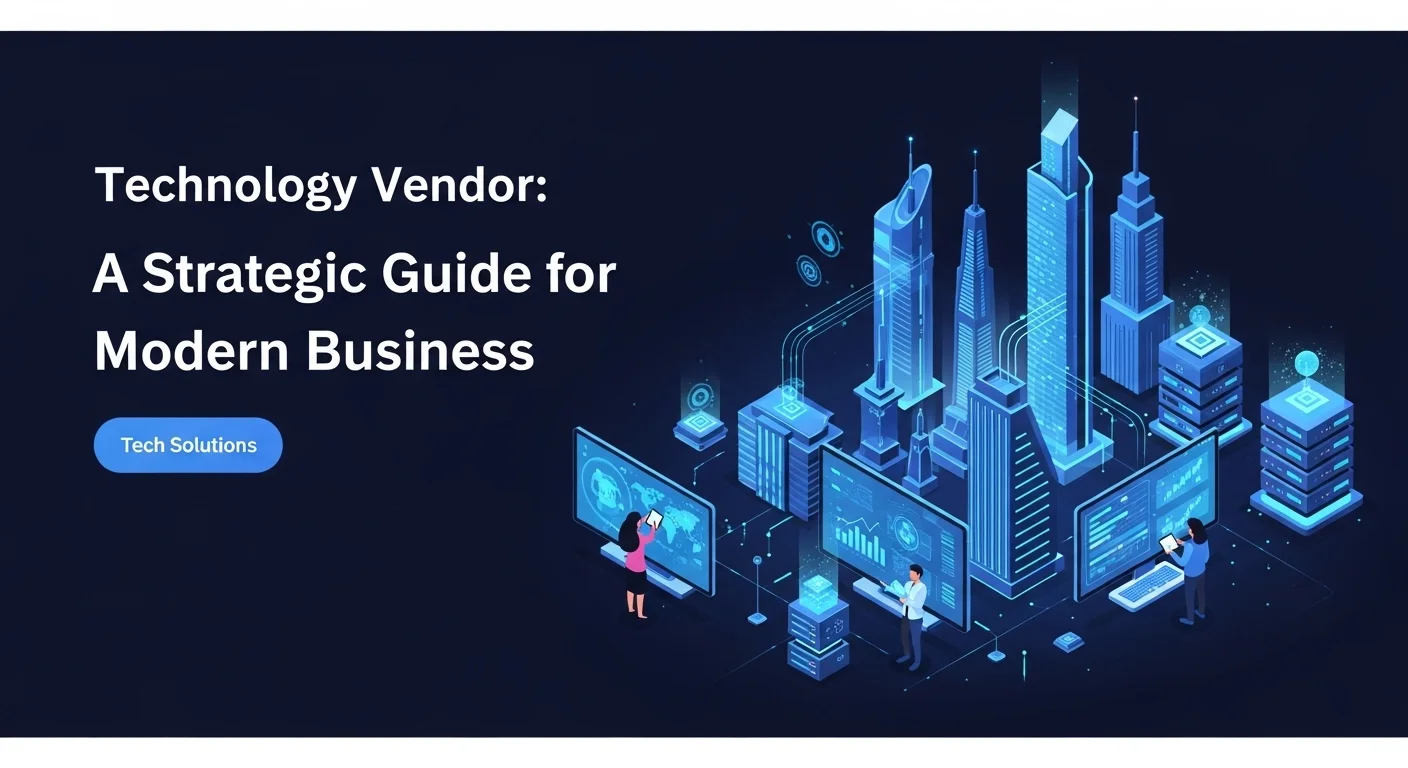How to Power Your Business with Tech: My Personal Guide for 2025

Executive Summary
In my years helping entrepreneurs, I've seen technology shift from a 'nice-to-have' luxury to the absolute engine of a business. It's the difference between merely surviving and truly thriving. If you have a vision for your own company, getting a handle on the right tech is no longer optional—it's your foundation for growth and innovation. This guide is my personal playbook for you. We'll cut through the jargon and talk about what really matters: using Artificial Intelligence to automate tasks and make smarter decisions, leveraging the cloud for ultimate flexibility, and building a digital fortress with cybersecurity to protect everything you've worked for. Whether you're launching a venture from your living room, exploring a new business concept, or thinking about scaling up into a franchise, the strategies here will give you a rock-solid tech footing. My goal is to empower you to make confident tech choices that will shape a brighter future for your business.
Table of Contents
Why Technology is Your Business's Co-Pilot
Let's be honest, the idea of 'my business' is deeply personal. It’s your dream, your sweat, your future. I remember when I started my first venture; it was just me, a laptop, and a whole lot of ambition. In today's world, technology is the silent partner that turns that ambition into reality. It’s the great equalizer. If you're running a business from home, the right tech makes you look and operate just as professionally as a company with a fancy downtown office. The digital age has opened the doors to entrepreneurship for everyone. When you're brainstorming a new business idea, technology shouldn't be an afterthought; it should be part of the initial sketch. You should be asking, 'How can tech give me an edge?' From e-commerce platforms that give you a global audience overnight to marketing tools that find your perfect customer, technology is what makes it all possible. And if you have big dreams, like expanding into a franchise, a solid tech framework is non-negotiable. It's how you ensure every location delivers the same quality and experience—the very heart of a successful franchise. Every great business idea today is intertwined with technology, whether it's an app that solves a unique problem or a traditional service that uses tech for flawless delivery and customer management.
The AI Advantage: Working Smarter, Not Harder
Technology's role goes way beyond just helping you get organized. It’s about transforming how you work. Take Artificial Intelligence (AI). This isn't science fiction anymore; it’s a practical tool that I've seen revolutionize small businesses. AI can take over the repetitive admin tasks that eat up your day, freeing you to focus on what really matters—growing your business. Imagine having a chatbot on your website that provides 24/7 customer support, answering questions and grabbing leads while you sleep. That’s AI. Imagine software that analyzes your customer data to predict what they'll buy next or helps you set the perfect price. That’s also AI. This kind of power used to belong only to massive corporations. Now, it's accessible to you. For a home-based business, this is a game-changer, giving you capabilities that punch far above your weight. When you're developing a new business concept, think about how you can bake AI in from the start. An online shop using AI for personalized recommendations will see higher sales and happier customers. Later, if you franchise, a central AI system can analyze data from all your locations, spotting trends and optimizing the entire operation. It's this data-driven approach that builds a strong, scalable brand.
The Cloud: Your Business's Foundation for Flexibility
If AI is the brains, cloud computing is the backbone of a modern business. I can't stress this enough: the cloud is your best friend. It eliminates the need for expensive servers and a dedicated IT room, which slashes your startup costs. For anyone launching a business from home, the cloud is everything. It means your critical files, from accounting records to client contracts, are stored securely and are accessible from anywhere. That’s freedom and peace of mind. Cloud-based software (often called SaaS) gives you access to powerful tools for accounting, customer relationship management (CRM), and project management for a small monthly fee. This pay-as-you-go model is perfect for a startup, as it scales with you. As your business grows, your tech capabilities grow right alongside it. When you're exploring business ideas, you’ll find that many complex models are only possible because of these affordable cloud tools. Thinking of franchising? The cloud makes it incredibly manageable. A central cloud system ensures every franchisee has the same software, training manuals, and brand materials, creating a consistent experience for every customer. Updates are pushed out to everyone instantly. It's a logistical dream come true, and it all starts with embracing the cloud from day one.
Cybersecurity: Protecting Your Hard Work
Finally, let's talk about something that's as important as locking your front door: cybersecurity. In our digital world, your data is one of your most valuable assets. I've seen firsthand how devastating a cyberattack can be to a small business; it can undo years of hard work in an instant. Cybercriminals often target smaller businesses, assuming their defenses are weaker. Protecting your venture from these threats is non-negotiable. If you're starting out from home, where your personal and business life can blur, you need to be extra vigilant. Simple things make a huge difference: use strong, unique passwords for everything, turn on multi-factor authentication, keep your software updated, and use a secure Wi-Fi network. When you’re developing a business idea that handles customer information, like an online store or a health service, a strong cybersecurity plan is a fundamental part of your business plan. Your customers' trust is everything. Earning it and keeping it starts with protecting their data. If you decide to franchise, cybersecurity becomes a network-wide priority. A weak link at one location could put everyone at risk. This means you need to set and enforce strict security rules for all franchisees, including training and standardized software. In short, technology isn't just a tool for your business; it’s the foundation for its creation, its growth, and its protection.

Your Complete Tech Playbook for Business Growth
Starting a business is a journey, and having the right map makes all the difference. This is your technical playbook, designed to guide you through the methods and resources that will turn your business idea into a reality. The first step I always advise my clients is to mindfully build their 'Tech Stack.' This is simply the collection of software services that run your business. The goal is to choose tools that are scalable, work well together, and fit what you actually need. If you're launching a home-based venture, you can start lean. A great foundation includes a professional suite like Google Workspace or Microsoft 365 for your email and documents, and accounting software like QuickBooks or Xero to keep your finances clean from the start. A Customer Relationship Management (CRM) system is also a must, even if you're a one-person show. Think of it as your digital memory. Free or low-cost options from platforms like HubSpot can help you track every lead and customer interaction. These tools are the bedrock for turning a concept into a cash-flowing operation. If you're aiming to scale into a franchise, your tech stack becomes the blueprint for replication. It needs to be robust, covering everything from sales systems and inventory to staff scheduling and reporting. The trick is to choose platforms that can handle multiple locations and grow with you, ensuring a uniform, high-quality experience for everyone.
Harnessing the Power of Smart Automation
Let's get practical about using these technologies. With Artificial Intelligence, one of the most powerful techniques is 'Process Automation.' You don't need to be a coder. Tools like Zapier or Make let you create simple 'recipes' that connect your apps. For example, you can set it up so that every time someone fills out a contact form on your site, their information is automatically added to your CRM and you get a notification. This is a lifesaver for a solo entrepreneur, as it handles the busywork so you can focus on bigger things. Another AI method is using 'Generative AI' for content. Tools like ChatGPT can help you draft blog posts, social media updates, and marketing emails, saving you countless hours. This is especially helpful when you're testing a new business idea and need to create marketing materials quickly. For a future franchise, 'Business Intelligence (BI)' powered by AI is essential. BI platforms can sift through sales data from all your locations to show you what's working and what's not. This means your big strategic decisions are backed by hard data, not just a hunch. When you're exploring a new venture, think about how data can be your secret weapon. For instance, a fitness app that uses AI to personalize workout plans based on user data will create a much stickier and more valuable experience.
Building Your Digital Fortress: Cybersecurity Methods
When it comes to cybersecurity, the best strategy is to create layers of defense. I always recommend a 'Zero Trust' approach. In simple terms, this means you don't automatically trust any user or device. Every request to access your data should be verified. For a home-based business owner, this means securing your home Wi-Fi with a strong password and, if possible, using a separate network for your business devices. A Virtual Private Network (VPN) is another essential tool. It encrypts your internet connection, which is crucial for keeping your data safe when you're working from a coffee shop or airport. Regular data backups are your safety net. Use a cloud service that automates this, so you know you can always recover your files if your computer is lost, stolen, or hit by a ransomware attack. It’s a non-negotiable. If you're building a franchise, you must create a standard security protocol for everyone. This includes mandatory training to help employees spot phishing emails—the number one cause of security breaches. Enforce the use of vetted security software across your entire network. If your business idea involves sensitive data, like in finance or health, encryption has to be built-in from the ground up. And for a simple but powerful technique anyone can use: get a password manager. It helps you create and store long, unique passwords for every service you use, dramatically improving your security with minimal effort.
Essential Resources for the Modern Entrepreneur
You're not alone on this journey. There's a wealth of affordable and even free resources out there. The U.S. Small Business Administration (SBA) offers tons of free templates and guides. Online learning sites like Coursera or Udemy have courses on everything you need to know, from digital marketing to accounting. Many tech companies also offer amazing free educational resources. HubSpot Academy, for example, gives away free certification courses that are genuinely valuable. When you need to choose software, sites like G2 and Capterra offer real user reviews to help you compare your options. For those planning a franchise, the International Franchise Association (IFA) is a key resource for best practices and networking. And don't underestimate the power of community. Online forums on Reddit or Facebook groups for entrepreneurs are fantastic places to ask questions, share your struggles, and learn from people who are on the exact same path. I've found that tapping into these resources can dramatically shorten your learning curve and help you sidestep common mistakes on your way to building a great business.

Insider Tips to Master Your Business Technology
Once you have your technology in place, the real magic happens when you start refining how you use it. It's about moving from just having the tools to making them work brilliantly for you. Here are some of the strategies I share with every business owner I work with to ensure their tech is a competitive advantage, not just an expense.
Give Your Tech a Regular Check-Up
One of the most important habits you can build is to conduct a regular 'Tech Audit.' Technology changes in the blink of an eye. The perfect tool for you last year might be outdated or too expensive today. At least once a year, sit down and review every piece of software and hardware you pay for. Ask yourself: Is this still the best tool for the job? Is there a better, more cost-effective option out there? Do all my tools talk to each other properly? This is absolutely critical for a home-based business, as it stops you from wasting money on subscriptions you don't use. If you're growing and thinking about franchising, a tech audit ensures that the core technology you provide to your partners is top-of-the-line and secure. It’s not just about saving money; it’s about making sure your entire operation is running as efficiently as possible. This simple discipline keeps you agile and ensures you're always using the best tools available.
Let Your Data Tell You a Story
Another game-changing strategy is to truly master your data. Data is one of your most valuable assets, but it's worthless if you don't use it. Start by identifying your Key Performance Indicators (KPIs)—the handful of metrics that truly define success for your business. This could be anything from your website's conversion rate to your customer acquisition cost. Make sure your tech is set up to track these KPIs accurately. For a solo entrepreneur, this might be as simple as correctly setting up Google Analytics and regularly checking the reports in your CRM. When you're brainstorming a new business idea, think about how data can create value. For a franchise, a central data strategy is everything. You need a dashboard that pulls in data from all locations, giving you a real-time snapshot of the entire network's health. This allows you to see what your top performers are doing right and replicate it, and to spot locations that need a little extra help. The goal is to shift from making decisions based on gut feelings to making them based on facts. It’s the signature of a well-run, modern company.
Put Your Business on Autopilot (The Smart Way)
Embracing 'Intelligent Automation' can feel like you've suddenly cloned yourself. This is about identifying any repetitive, manual task in your business and finding a tech solution to handle it. This could mean automating your social media posts with a tool like Buffer, setting up email marketing campaigns in Mailchimp that run on their own, or using AI to handle the first wave of customer support questions. The biggest benefit is time—the most precious resource you have. By automating these low-value tasks, you free yourself to focus on strategy, building customer relationships, and dreaming up what's next. When you're developing a business concept, think about what can be automated from the very beginning. Building this into your processes makes scaling up so much smoother. For a franchise, automation is key to consistency and efficiency. You can automate franchisee onboarding, supply orders, and even local marketing efforts. It makes the entire business model more profitable and attractive for everyone involved.
Remember, Tech Should Serve People
This is my most important tip: never lose the human element. Technology is a tool to enhance human connection, not replace it. This is especially true for customer service. While chatbots are great for answering simple questions, always provide a clear and easy way for a customer to talk to a real person. Use your CRM not just to track sales, but to remember the little things about your customers that build real relationships. For an entrepreneur running a business from home, this personal touch is your superpower against bigger, faceless competitors. When you're evaluating a business idea, ask how technology can create a better human experience. If you franchise, the tech you provide should empower your partners to offer amazing, personalized service at the local level. It should free them from paperwork so they can spend more time with their customers. Ultimately, technology should be the bridge that connects you to your customers, not a barrier that stands between you.
Expert Reviews & Testimonials
Sarah Johnson, Small Business Owner ⭐⭐⭐⭐
As a small shop owner, this was a great starting point. I especially liked the part about using automation to save time. I would have loved a few more budget-friendly tool recommendations, but it's very helpful!
Mike Chen, IT Consultant ⭐⭐⭐⭐⭐
A solid overview. The breakdown of cybersecurity for home-based businesses is spot-on. As an IT consultant, I'd say this is a fantastic resource to share with clients who are just starting to build their tech stack.
Emma Davis, Entrepreneur ⭐⭐⭐⭐⭐
This is one of the best articles I've read on the topic. The author's personal experience shines through, making complex concepts like AI and cloud computing feel accessible. I finally understand how to put these tools to work for my own venture. A must-read!



